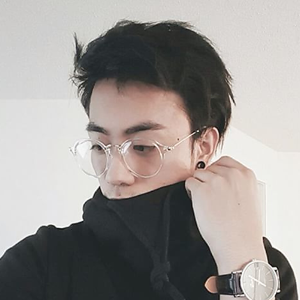Qian Qiao Bo led Yang to a small kitchen.
He emptied a clay jug of water into two cups and handed one to Yang. “I’ll be back,” he said to Yang after seating him at a wooden table. The farmer disappeared into the house and Yang wished he were home so he could wash the journey off his body. His hair was oily – haphazard – and he smelled deeply of sea salt.
The house croaked with every caress of the outside breeze and for many moments, Yang thought the structure might collapse upon him. The kitchen was compact, wooden and stripped bare. Through the window, he could see a well in the back garden as well as a bare, burnt spit not too far from it. A discoloured steel tub sat complacently beside it.
Between the house’s wooden moans, Yang could hear hushed whispers emanating from the eastern side of the house. A man and a woman. Qian Qiao Bo and his qizi1 most likely. He tried to recall the ayi’s2 name but his mind hit a blank.
Qian Qiao Bo finally returned. His face had been washed, his hair wetted back and he swapped out his apparel for a cleaner yet identical set. There were odd patches of brown fabric where the tunic and trousers had been repaired. He sat down opposite Yang. “Do you want to freshen up?” he asked. “We have a spare room. Na Na can fill up some water for you.”
So that was the ayi’s name. Qian Na Na. No particular bells rang.
“Spare room?” echoed Yang. In his year-old recollections, he did not remember the Qians’ having a spare room.
“Ah Na…met with an accident.”
Yang’s heart stuttered. That sent those bells chiming. Ah Na was not someone he would forget. And yet she had slipped his mind as easily as everything else. She was five when he’d left for Canton and she’d be eight now. He remembered the Qians’ daughter with a clarity he could not pay them. The village was overjoyed with her birth – it was a miracle at Na Na ayi’s age. Their second child. Their first was a son – Na Yi. Yang was amazed at how much he forgot over the year, how much sunk below the surface and waited patiently for rediscovery. Na Yi was older than him, and he had hopped off to make his way up in the Dowager Ci Xi’s guard3.
“I’m sorry,” Yang said. So much had come to happen in his absence. Somehow, he couldn’t picture the joyful, exuberant girl from his memories simply…not being. He shied away from the thought.
“It is of no matter,” the man said in a somewhat dismissive fashion that made Yang rethink. “Shall I bring you a basin?” he pressed.
“No, thank you,” said Yang. “I’d prefer to go home.”
Qian Qiao Bo gave out an elongated sigh. “I’m sorry, Yang,” he said. “That won’t be possible.”
Yang’s hands clenched into fists beneath the table. Not again. “Why not?” he asked, his lips dry and chapped, his throat raw.
“Your house…your home has been converted into a shelter.”
“A shelter,” Yang repeated dumbfounded.
“Yes. For the homeless. For those who cannot afford a home in these times. For the elderly, widowed and orphaned.”
Yang’s throat tightened. He struggled to breath. “But what about my family?”
The farmer looked away, through the window. “I’m so sorry, Yu Yang. Your family… has passed on.”
“My father and my mother?” Yang asked, with a lump in his throat. His heart faltered. He had no one. No one. Why did he go to Canton? Why couldn’t he have been satisfied with the good life provided for him here in Beisha?
“I’m very sorry.”
Tears pricked Yang’s eyes.
“The estate is, of course, entailed to you. The authorities have been threatening to repossess the lot in the event of an absent heir. I understand if you are not ready to speak of it right now, but it is important you consider donating the establishment to good will.”
No, Yang wanted to shout. That’s my home. But he couldn’t. It was for a good cause. He took a deep breath; he had a lot of practise bottling his emotions. “I’d like to go home,” he said.
Qiao Bo breathed another immense sigh. “You can’t,” he said. “It is no longer your home. Houses have been built on the fields and the animals are long gone. There are no empty rooms – it is at capacity. In any event, it has been completely refurbished. It does not even look like your home anymore.”
But I still own it.
But I saw the curving roof.
But it’s mine.
It was as though his heart were suspended in time. Yang could not breathe. He could not even return home. He had come back to China, he had endured the ugliest faces of humanity, to be turned away from the place he had thought would always belong to him. He felt ill. “What are you saying?” Yang said, after a moment.
The farmer let out an impatient sigh. “You cannot seriously think that you can return in English rags after a year and take back what this community deserves.”
“My clothes are Indian,” Yang said quietly. “And the farm is rightfully mine.”
Anger twitched in the muscles in the farmer’s shoulder. “Indian?” he scoffed. “While your country battles the borders with the Sikhs, you return here in their wares, bearing their name?” Qiao Bo let out a furious breath. “If that’s where you were off galivanting to as we tended to your ailing parents, then the loss of the estate is no less than what you deserve.”
I was kidnapped, Yang wanted to yell. Something held him back. His instincts stroked the words off his tongue until they recoiled and dissipated.
“My mother was not sickly,” Yang insisted. “She would never have taken ill.”
Qiao Bo’s dark eyes flashed. “Wouldn’t she? Not when she had to run the entire farm and nurse your father? Not after she buried him, and lived alone on an isolated farm whilst the army marched through? Not when the crops withered and the animals sickened?”
Yang looked away, his heart feeling heavy.
“Your family is dead, Yu Yang,” the farmer said. “And you have nothing to show for it.”
“I want to see the renovation.”
Qian Qiao Bo opened his mouth, but he was quickly silenced: “Take him there,” the farmer’s wife entered the kitchen closed the kitchen door behind her. Yang met her penetrating gaze; she looked different from the woman in Yang’s memories. This woman was as thin as a rake, with protruding bones and brittle white hair sticking from her head in odd angles. This woman’s face was wrinkled like crunched paper. This woman looked haggard and old. “Do it,” she repeated, her voice hoarse.
Qiao Bo stood up abruptly, sending Yang’s heart fluttering. “Fine,” he growled and before marching out of the kitchen: “Ten minutes.”
The farmer slammed the door behind him and the entire house rattled. Yang suppressed a shiver.
“I’m sorry for my husband’s behaviour,” Qian Na Na said, pouring water into a cup for herself. “He is defensive when it comes to the home.”
“The home?”
“That is what they call your farm now. Understand that the pain you are feeling right now? The reestablishment of the farm as a community centre has relieved five times that. Children orphaned and women widowed by the wars now have a roof over their heads, now they are safe.”
Yang’s mouth felt dry. He sipped the water; it tasted stale and dusty.
“Sour, isn’t it?” the old woman said, sitting down. “The water is old, the animals are old, the people grow old – this town is too small for the notice of the regency, and the cities are too dangerous. Who do we turn to? Where do we go?” the woman began to shake her head. She slurped up the water in her cup as though dehydrated.
Yang felt ill. Torn.
“Even if you do donate the farm, it will not solve anything. We will still starve. We will still die. A roof only prolongs it.”
Realisation washed over Yang. “You don’t want me to relinquish the farm.”
Qian Na Na’s eyes glittered, something devious sparkling. “No,” she admitted. “What good will that do? In the end, they will die. In the end, we all will. There is no food. There is only war and death, and now famine. Why should there be shelter?” She laughed cruelly for a second and stood up: “Come, you must be tired after your journey. Clean yourself…then go outside to dirty yourself once more. Such is life, no?”
Na Na’s cold smile sent shivers down Yang’s spine. He followed her to what he assumed was Ah Na’s old room – a fresh basin of water on a table in the corner. Na Na closed the door behind Yang, and he tried to ignore the goosebumps bubbling on his arms. He wiped the grime from his face with a damp washcloth and looked out at the speckled green fields from the small window. He squinted and upon closer appraisal, he noticed the slight yellowing to the withering leaves. China had truly changed. The air tasted dry. Nothing would grow in this weather.
A knock on the door yanked Yang from his thoughts. “Are you ready?” Qiao Bo asked gruffly, opening the door slightly.
“I’m ready,” Yang said.
He was not.
The mule was too tired to cart them over, and so they walked. The sun beat down upon them, sweat drenching their tunics, salty wetness clinging to their faces. Yang bent down and grasped the coarse sand granules between his fingers – his suspicions confirmed.
“Nothing will grow here, will it?” he asked the farmer.
The farmer gave him a long look. “No. Roots refuse to take home in the soil.”
Yang used his hand as a shield against the piercing sunlight. “The soil is damaged,” he said. “Do you rotate the fields between harvests?”
“What?”
“Every three years, do you leave the fields to rest and sow elsewhere?”
Qiao Bo raised a brow. “No.”
Yang nodded. “The nutrients have been drained. It cannot absorb water. Crops will not take root here.”
They continued walking, a queer look etched on the farmer’s face. “How do you know this?” he asked.
The English, Yang almost said. But he would die before he credited them anything. And the farmer did not know of Yang’s escapades in England. His mouth was dry, He licked his lips and tasted sweat. “I just do.”
Silence stretched for the remaining length of the journey. Yang eyed the farmer warily; things were different in Beisha now. Both Qian Qiao Bo and his wife were jaded, and China was not as he remembered. War never changes, yet it changes everything.
Yang’s farm was different too. Gone were the lush green fields, the fat animals, the shouting of the farmhands, the braying of the mules. Gone was the house he was born in, grew up in, and lived in. In its place, stood the large unassuming shadow of the farmhouse. Like detachable hands, poorly constructed additions snaked through the lands, the iron discoloured where iron was used, and the wood rotting where wood was used. Behind the newly erected structure, for as far as Yang could see, small houses dotted into the horizon. Fires burned dangerously outside each of the houses, kindled smoke dancing in grey patterns toward the skies. Children screamed and laughed and played in old, patched clothing, older women sitting on the steps to the farmhouse, and on chairs, like sentinels, with wizened expressions on their faces.
Qian Qiao Bo had been right. This place was no longer home. If anything, it was nothing short of a small village – one without traders or men or young to work.
“Do you see now?” Qiao Bo asked.
“I see,” said Yang.
But he wished he did not. This was no longer home. China was no longer home. Home was gone and now there was nothing.
1. Chinese term for ‘wife’. Also synonymous is ‘taitai’.
2. Chinese term for ‘aunt’ or respectable title for an older woman.
3. Empress Dowager Ci Xi ruled China between 1861 to 1908 – a good two decades after the events of this story. Still, she was prominent during the timeframe of the story and is often blamed for being one of China’s…less than stellar rulers. She ruled hand in hand with Empress Dowager Ci’An after ousting the late Emperor’s council and assuming regency.











Comments (0)
See all